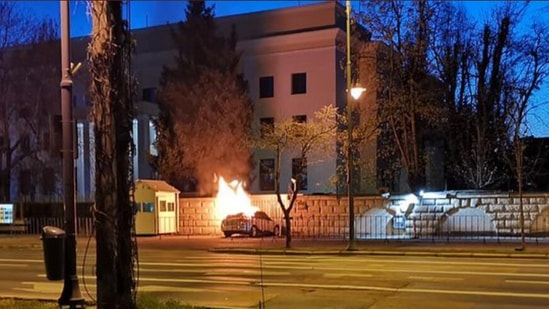Driver killed as car crashes into gate of Russian embassy in Romania's Bucharest: Police
The car, a sedan, rammed into the gate at 6am on Wednesday but could not enter the embassy compound, the police said.
Police in Romania's capital, Bucharest, said on Wednesday that a car crashed into the gates of the Russian embassy in the city, bursting into flames, and killing the driver.

Click here for all live updates on Russia-Ukraine war
Detailing the incident, the police said that the car, a sedan, rammed into the gate at 6am, adding that the vehicle, however, could not enter the embassy compound. “Firefighters who arrived at the scene were able to douse the flames but the driver died on the spot,” a police spokesperson informed.
Also Read | Ukraine war: Zelenskyy urges UN to act; Russian diplomats expelled
Unverified videos and images doing the rounds on social media show a car engulfed in flames as security forces run through the area.
While the police are yet to ascertain the motive behind the incident, it took place in the backdrop of the ongoing Russian invasion of Ukraine, which began on February 24. Romania shares a long land border with Ukraine, and has accepted more than 600,000 refugees from its neighbour since the crisis began. The invasion has led to anti-Russia protests outside Russian embassies in world capitals, including in Bucharest.
Also Read | EU proposes to ban Russian coal imports in new sanctions
The incident also took place a day after Romania expelled as many as 10 Russian diplomats from the Russian embassy in the capital city. “The actions of the 10 workers contravene the provisions of the 1961 Vienna Convention on Diplomatic Relationships. They have been declared persona non grata,” the Romanian Foreign Ministry said in a statement.
Also Read | Ukraine mass killings: A lowdown as world reacts with horror
In recent days, several European Union (EU) member states have expelled Russian diplomats in retaliation for the invasion.
(With agency inputs)



